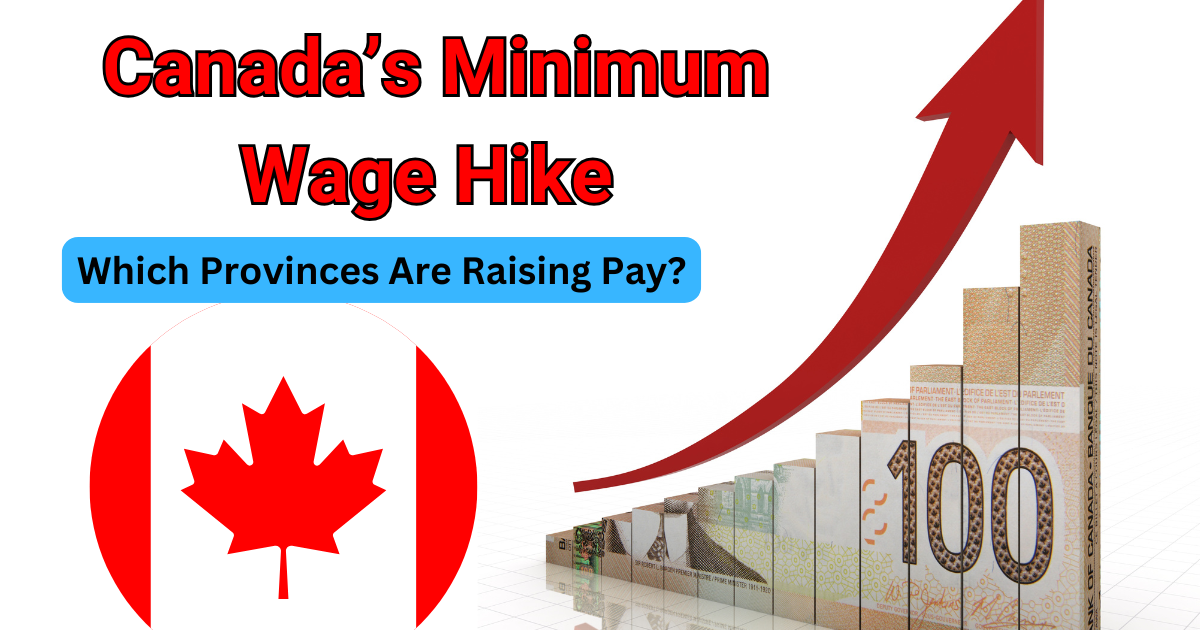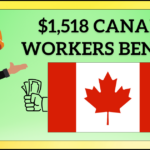Canada’s Minimum Wage Hike 2025 – Which Provinces Are Raising Pay?: The Canada Minimum wage Increase in 2025 ensures higher earnings for workers across provinces. Learn about province-specific changes, effective dates, and practical advice for workers and employers to make the most of these updates.
Canada’s Minimum Wage Hike 2025
Canada’s minimum wages across Canada are set to increase once again, reflecting the federal and provincial governments’ commitment to ensuring fair pay and addressing inflation. The Minimum wage hike aims to provide workers with better financial stability while considering the economic conditions unique to each province and territory.

Nova Scotia’s newly re-elected government is making good on its campaign pledge of implementing the province`s largest-ever minimum wage increase in 2025. The base wage will rise by $1.30 in two stages:
- April 1, 2025- a $0.50 increase to $15.70 per hour
- October v1, 2025- An additional $0.80, bringing it to $16.55550 per hour
By understanding the adjustment and their implications, both workers and employers can navigate the transition effectively and capitalize on the opportunities.
| Province/Territory | Current Minimum Wage | Effective Date | New Minimum Wage | Percentage Increase |
|---|---|---|---|---|
| Yukon | $17.59 | April 1, 2025 | TBD | TBD |
| Newfoundland and Labrador | $15.60 | April 1, 2025 | TBD | TBD |
| Nova Scotia | $15.20 | April 1, 2025 | TBD | TBD |
| New Brunswick | $15.30 | April 1, 2025 | TBD | TBD |
| Prince Edward Island | $16.00 | April 1, 2025 | TBD | TBD |
| British Columbia | $17.40 | June 1, 2025 | TBD | TBD |
| Ontario | $17.20 | October 1, 2025 | TBD | TBD |
| Manitoba | $15.80 | October 1, 2025 | TBD | TBD |
| Saskatchewan | $15.00 | October 1, 2025 | TBD | TBD |
New minimum wage amounts will be announced closer to the effective dates.
Which Provinces Are Raising Pay?
Yukon
- Current Minimum Wage: $17.59 /hour
- Next Adjustment: April 1, 2025
- Details: The Yukon Government adjusts wages annually based on the Consumer Price Index (CPI)
Newfoundland and Labrador
- Current Minimum Wage: $15.60/hour
- Next Adjustment: April 1, 2025
- Details: The province aligns its increases with inflation trends to ensure wages reflect current living costs.
Nova Scotia
- Current Minimum Wage: $ 15.20
- Next Adjustment: April 1, 2025
- Details: The new wage will be informed by consultation with labor groups and economic experts.
New Brubswick
- Current Minimum Wage: $15.30/hour
- Next Adjustment: April 1, 2025
- Details: Adjustments aim to close wage gaps and align pay with regional economic realities.
Prince Edward Island
- Current Minimum Wage:$16.00/hour
- Next Adjustment: April 1, 2025
- Details: The province`s ongoing wage reviews reflect its focus on equitable pay.
British Columbia
- Current Minimum Wage:$17.40/hour
- Next Adjustment: June 1, 2025
- Details: BC regularly leads Canada in minimum wage increases, reflecting its high cost of living.
Ontario
- Current Minimum Wage:$17.20/hour
- Next Adjustment: October 1, 2025
- Details: Wage hikes align with Ontario`s commitment to fair compensation for workers.
Manitoba
- Current Minimum Wage:$15.80/hour
- Next Adjustment: October 1, 2025
- Details: The Increase will be based on consultations with labor and industry stakeholders.
Saskatchewan
- Current Minimum Wage:$15.00/hour
- Next Adjustment: October 1, 2025
- Details: Saskatchewan plans incremental increases to balance business and worker needs.
Why Minimum Wage Increases Matter?
Minimum wage adjustments are a critical tool for ensuring that workers can keep pace with inflation and maintain their purchasing power. These increases aim to:
- Combat Inflation: With the cost of living rising, wage adjustments ensure that workers can afford necessities.
- Enhance Woker Retention: Competitive wages improve job satisfaction and reduce turnover rates.
- Promote Econimic Equity: Minimum wage hikes reduce income disparities and foster financial inclusion in Canada.
Practial Implications of Wage Incresae
For Workers
- Increased Take-Home Pay: Higher wages mean more disposable income for housing, food, and transportation.
- Improved Job Satisfaction: Fair pay fosters workplace satisfaction and loyalty
- Budget Opportunities: Workers can plan for savings or investments with the additional income.
- Better Quality of Life: Higher wages reduce financial stress and improve living conditions.
- Potential for economic Mobility: This can lead to greater economic mobility for immigrants looking to advance to higher-paying roles.
For Employers
- Increased Labor Costs: Businesses should anticipate higher payroll expenses and budget accordingly.
- Retention and Recruitment: Competitive wages attract and retain talent, reducing turnover costs.
- Mony Adjustments: To adjust, the businesses may need to arrange the money goods and services to offset higher wages.
- Changes in Hiring Practices: Employers might seek to reduce costs by hiring part-time workers or using temporary contracts.
- Boost to Consumer Spending: While businesses may face higher labour costs, workers with higher wages will likely spend more, benefiting the economy.
Conclusion:
In this article, we discussed Canada’s Minimum Wage Hike 2025 – Which Provinces Are Raising Pay. Workers and employers can navigate the transition effectively and capitalize on the opportunities. Workers can plan for savings or investments with the additional income, and Businesses should anticipate higher payroll expenses and budget accordingly.



